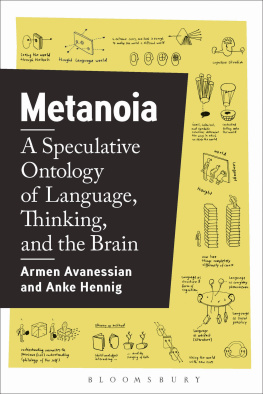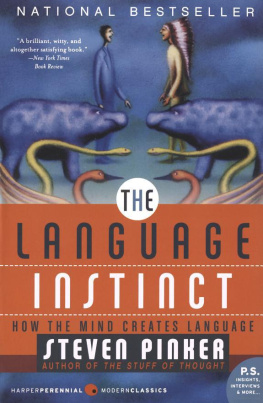Max Louwerse - Keeping Those Words in Mind
Here you can read online Max Louwerse - Keeping Those Words in Mind full text of the book (entire story) in english for free. Download pdf and epub, get meaning, cover and reviews about this ebook. year: 2021, genre: Children. Description of the work, (preface) as well as reviews are available. Best literature library LitArk.com created for fans of good reading and offers a wide selection of genres:
Romance novel
Science fiction
Adventure
Detective
Science
History
Home and family
Prose
Art
Politics
Computer
Non-fiction
Religion
Business
Children
Humor
Choose a favorite category and find really read worthwhile books. Enjoy immersion in the world of imagination, feel the emotions of the characters or learn something new for yourself, make an fascinating discovery.

- Book:Keeping Those Words in Mind
- Author:
- Genre:
- Year:2021
- Rating:5 / 5
- Favourites:Add to favourites
- Your mark:
- 100
- 1
- 2
- 3
- 4
- 5
Keeping Those Words in Mind: summary, description and annotation
We offer to read an annotation, description, summary or preface (depends on what the author of the book "Keeping Those Words in Mind" wrote himself). If you haven't found the necessary information about the book — write in the comments, we will try to find it.
Keeping Those Words in Mind — read online for free the complete book (whole text) full work
Below is the text of the book, divided by pages. System saving the place of the last page read, allows you to conveniently read the book "Keeping Those Words in Mind" online for free, without having to search again every time where you left off. Put a bookmark, and you can go to the page where you finished reading at any time.
Font size:
Interval:
Bookmark:


An imprint of The Rowman & Littlefield Publishing Group, Inc.
4501 Forbes Boulevard, Suite 200,
Lanham, Maryland 20706
www.rowman.com
Distributed by NATIONAL BOOK NETWORK
Copyright 2021 by Max Louwerse
All figures created by the author unless otherwise noted.
All rights reserved. No part of this book may be reproduced in any form or by any electronic or mechanical means, including information storage and retrieval systems, without written permission from the publisher, except by a reviewer who may quote passages in a review.
British Library Cataloguing in Publication Information Available
Library of Congress Cataloging-in-Publication Data
Names: Louwerse, Max, author.
Title: Keeping those words in mind : how language creates meaning / Max Louwerse.
Description: Lanham, MD : Prometheus Books, [2021] | Includes bibliographical references and index. | Summary: By examining how our brains process language and find patterns, the intricacies of the language system itself, and even scientific breakthroughs in computer science and artificial intelligence, Keeping Those Words in Mind brings a brand new and interdisciplinary explanation for our ability to extract meaning from language.Provided by publisher.
Identifiers: LCCN 2020046347 (print) | LCCN 2020046348 (ebook) | ISBN 9781633886506 (cloth) | ISBN 9781633886513 (epub)
Subjects: LCSH: Psycholinguistics.
Classification: LCC BF455 .L68 2021 (print) | LCC BF455 (ebook) | DDC 401/.9dc23
LC record available at https://lccn.loc.gov/2020046347
LC ebook record available at https://lccn.loc.gov/2020046348
 The paper used in this publication meets the minimum requirements of American National Standard for Information SciencesPermanence of Paper for Printed Library Materials, ANSI/NISO Z39.48-1992.
The paper used in this publication meets the minimum requirements of American National Standard for Information SciencesPermanence of Paper for Printed Library Materials, ANSI/NISO Z39.48-1992.
O nce upon a time there was an ant. Just an ordinary ant. That ant went on a mission for a walk on a beach. Any beach. The tiny little ant walked with perseverance and dedication over the sandy beach, with almost-insurmountable sand hills it had to conquer. The tiny little ant moved one way, then moved another way, finding a route and then soon looking for an alternative one. The ant took a detour, quickly circumventing an obstacle and crisscrossing across the beach, determined to accomplish the major achievement of crossing the large sand plane. And what an achievement that is for a tiny little ant!
When observing the path of the ant, we see an incredibly complex and carefully thought-out route on a massive spatial map of the beach. From our point of view, the ant demonstrates very complex behavior. We can try to map out the behavior and see all kinds of patterns and deviations from those patterns. We could ask ourselves the question of how a tiny little ant is able to cross a beach and how it has acquired such complex behavior.
Perhaps the ant has been carefully trained by its ant parents how to cross a large surface. Father and mother ant have shown the tiny little ant how to cross a beach, and by repeating this behavior over and over again, the tiny little ant has now mastered beach-crossing skills. The tiny little ants parents rewarded their child with sugary nectar after it accomplished the task. Or perhaps the tiny little ant was born with a beach-crossing instinct. As with any other ant in the world, maybe our tiny little ant was born with a brain attuned to this kind of beach-crossing behavior. Despite its small brain size, the tiny little ants brain stood the test of evolutionary time and specialized in beach-crossing behavior.
Another explanation for our tiny little ant mastering the complexity of beach crossing comes from the massive computations the ant is able to make when crossing a beach. The tiny little ant takes in information, distributes these pieces of information to the desired output, and learns over time how to cross the beach. It computes one route, estimates its performance of choosing an alternative route, and carefully weighs the probabilities of which route is the best option to select. Slowly but surely, the ant builds a network of optimized probabilities that allows it to crisscross the sandy beach in an efficient way.
Yet another explanation as to how the tiny little ant is able to cross the beach is that the ant simulates the routes by making use of its magnificent memory skills. The ant imagines how to cross the beach by simulating its leg and body movements. It is aware of its own body, is immersed in its environment, and embodies its route. The head and body of the ant allow for conquering certain sand hills, but not others, and by being aware of itself and its environment, the ant is able to perceptually simulate any route on any beach. Basically, the tiny little ant does not observe the route; it is part of the route.
But there may be another explanation that complements the explanations mentioned thus far. That explanation, however, does not lie in training, instinct, network, or embodiment. It lies outside the tiny little ants brain or the brains of the tiny little ants parents! The behavior of crossing the beach indeed looks complex. But perhaps the complex behavior our tiny little ant demonstrates reflects the complexity of the environment in which it finds itself.
This book is not about tiny little ants and is not about beaches. Neither is this book about beach-crossing behavior. This book is about words and how we keep them in mind. It is about language and how it creates meaning. Metaphorically speaking, this book is about a beach and how it creates a path. And we, we are the tiny little ants.
Take, for example, the faculty of language. It involves in reality a host of distinct powers. We must first have images of concrete things and ideas of abstract qualities and relations; we must next have the memory of words and then the capacity so to associate each idea or image with a particular word that, when the word is heard, the idea shall forthwith enter our mind. We must conversely, as soon as the idea arises in our mind, associate with it a mental image of the word, and by means of this image we must innervate our articulatory apparatus so as to reproduce the word as physical sound. To read or to write a language other elements still must be introduced. But it is plain that the faculty of spoken language alone is so complicated as to call into play almost all the elementary powers which the mind possesses, memory, imagination, association, judgment, and volition.
William James
A s soon as Bill Lowery left his home, he realized something was wrong. He had woken up like any other morning, said good morning to his wife and his son, and joined them for breakfast. It had been an early morning. The night before he had studied hard on a list of medical terms and their meanings for a sales pitch that day, dozens of new products from stethoscopes to electroencephalographs to sphygmomanometers. At least the names of products were accompanied by their pictures, so that memorizing the names was tedious yet manageable. While shaving in front of the bathroom mirror, Bill tried to cram the last few words in his mind by mentally linking the words to their pictures.
Getting into his car, Bills neighbor mentioned to him the exciting news that his encyclopedia had a litter of nine dogs. Bill first assumed he had misheard, after all, the coffee had not quite woken him up yet. But when he arrived at work, he walked to his desk and heard his junior co-workers joking about teaching old dogs new trumpets. Bill guessed he was just slightly confused, perhaps because of all that memorizing of words and their meanings the night before. He struggled throughout the morning, but around lunchtime, he realized that it was not that he had misheard his neighbor, nor that he had misunderstood his co-workers, but that something more serious was going on. Waiting for the elevator to arrive for his lunch break, Bills colleague asked him: Do you know a good place to have some dinosaur? Bill knew all too well that dinosaurs do not get served for lunch, and he was also too aware his colleague hardly ever joked. Now he was quite certain something was wrong. Even more confused than he already had been so far, Bill stepped into the elevator, and while going down to the main floor, he overheard his colleagues being involved in an animated conversation.
Font size:
Interval:
Bookmark:
Similar books «Keeping Those Words in Mind»
Look at similar books to Keeping Those Words in Mind. We have selected literature similar in name and meaning in the hope of providing readers with more options to find new, interesting, not yet read works.
Discussion, reviews of the book Keeping Those Words in Mind and just readers' own opinions. Leave your comments, write what you think about the work, its meaning or the main characters. Specify what exactly you liked and what you didn't like, and why you think so.










